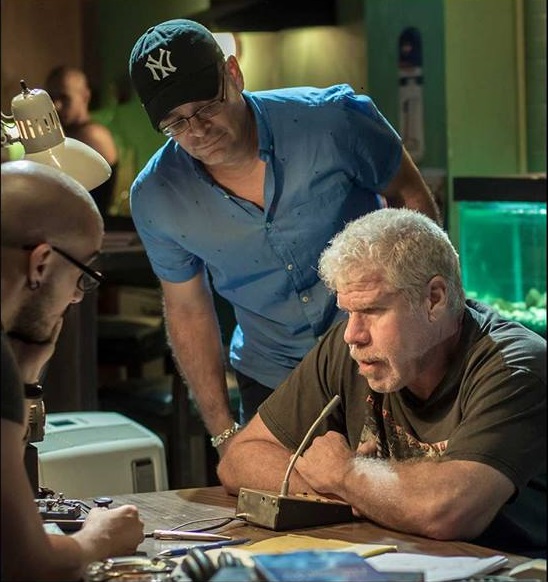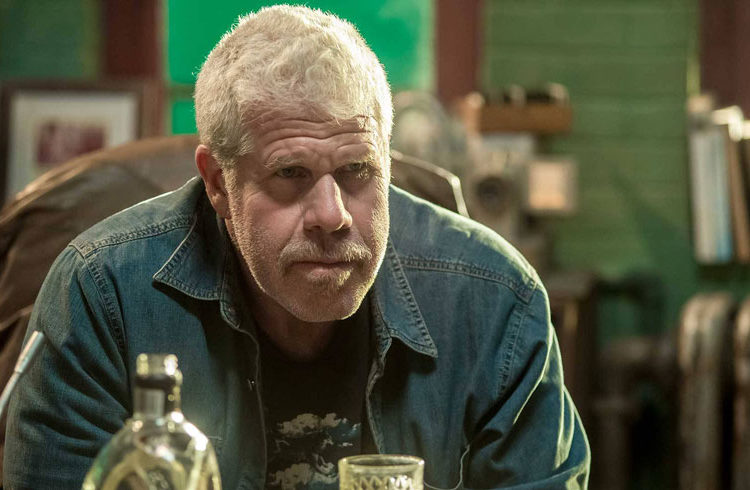For Cubans Ron Perlman will always be Vincent, the main character of the TV series Beauty and the Beast, a role that made an impression on several of the island’s generations ever since it was broadcast for the first time in the late 1980s.
But starting now, Perlman – who has been Amoukar in Quest for Fire, Salvatore in The Name of the Rose, Angel in Cronos and in Hellboy in the saga of the same name – will also be Peter, the “quasi revolutionary Jewish journalist from New York,” in the Cuban film Sergio and Sergei.
The film, directed by Ernesto Daranas (Los dioses rotos, Conducta), was premiered in Cuba as part of the 39th International New Latin American Film Festival, and the famous U.S. actor didn’t want to miss it.
He traveled to Havana for a premiere that had to be suspended a few times but that finally had its reward last Wednesday in the Acapulco movie theater.
“It was really exciting,” he said a day later to the press in the Hotel Nacional. “I was able to feel the spectators during the entire presentation: they laughed at every funny thing, remained very quiet and reverent with each moving scene, and believe me, I’ve been in the presentation of many movies in 45 years and the final applause was genuine and pure love for the film.”
Perlman accompanied Daranas and other members of the film crew in a press conference, in which he told how he got involved in the project and showed all the charisma and sense of humor that the film’s director advanced when presenting him.
“He is very professional and a very congenial guy to film with,” the director commented when telling the story about his first meeting in Cuba in which, through producer Adriana Moya of RTV Comercial, he negotiated with Perlman his participation in the film.
The actor responded with a joke: “Daranas convinced me because he said there would be a lot of chocolate on the set…. But there was no chocolate.”
The protagonist of series like Sons of Anarchy and Hand of God did not hide the emotion Cuba awakens in him, a passion that, he affirms, he caught from Mexican filmmaker Gabriel Beristain. He traveled to Havana with him to explore possibilities of collaboration and ended up finding a link with his own life, with his past.
“I wouldn’t know how to describe well how I felt in Cuba, but it was like when you leave home and get to another place in which you feel you are home again. It was a very moving, very gut feeling,” he said to OnCuba.
“I felt like when I was 10, when I was experiencing childhood and adulthood at the same time, and I remembered things from my own life linked to Cuba, like President Kennedy’s assassination, the Bay of Pigs invasion, the Missile Crisis, experiences that marked my political awakening. It was very moving to come and be able to be part of the film.”

Sergio, Sergei and Peter
In Sergio and Sergei, Ron Perlman shares the protagonist triad with Cubans Tomás Cao and Héctor Noas, who play the part of a Cuban professor of philosophy and radio ham (Sergio) and of a Russian cosmonaut trapped in the Mir space station (Sergei).
Perlman was proposed the role of Peter, a New York Jewish journalist who is trying to expose the corruption in his country’s government, is watched by government agents and starts communicating with the other two in an attempt to rescue the abandoned Russian cosmonaut.
However, the American – very Jewish and a New Yorker – has his own (funny) version of the story:
“I started wondering what my job in the film would be and I asked Adriana [Moya] if what they wanted was that a play the role of the Cuban professor of philosophy, and she said no. Then I said to her ‘OK, you want me for the Russian cosmonaut,’ and she said no again, so I told her that I couldn’t be a Jewish U.S. journalist who lives in New York because that wasn’t me.”
Apart from the joke, Perlman affirmed having been fascinated with “a plot that mixes such different characters and political and ideological positions in one same story,” in such a significant moment as 1991, the fall of the Berlin Wall and the collapse of the Soviet Union.
“I loved all that,” he confirmed to OnCuba.
For the actor it was a delight to work with Daranas, whom he calls “a visionary director.” His character, he said, has “a beautiful evolution” based on what was initially written in the script, thanks to the interaction between him and Daranas.
“He is the most important person in this entire mix,” he said.
More than a character
Perlman was so enthusiastic about the project that he even decided to participate in its production, at a time in which he was launching his own independent studio (Wing & A Prayer Pictures).
Thus he fully embraced what he would later define as “the first Cuban-American feature coproduction in almost 60 years,” together with Cuba’s RTV Comercial and ICAIC, the Spanish MediaPro and the international producer WestEnd Films.
“For me it was clear that if we made this project come true it would be one of the most amazing moments of my life,” he affirmed at the press conference.
He was especially attracted by the possibility of working far away from the big Hollywood studios.
“When making an independent film you know that all the persons involved are not in it for the money but because they love cinema and share the enthusiasm for the film’s vision. That is the purest of the experiences an artist can have.”

Perlman’s political intrepidness also played a part.
“I supposedly shouldn’t have been in Cuba. Obama still hadn’t come and I didn’t even know if it was legal to be here having a beer,” he commented.
“To be able to film, I had to go to the American Actors Association because I can’t work anywhere on the planet without their permission, and the Association reminded me that there was an embargo, and I said to them: ‘Really? I hadn’t heard about that…,’” he said between chuckles.
“There were many weapons pointed at many heads, but I’m very proud to have gotten the Association to allow me to come to Cuba to film as a guest actor. I had to fill out many permit pages to be able to work here, on a film in which what was most important wasn’t the money but rather the love of cinema, but in the end we were able to do it.
“Imagine what I feel to be one of the first American actors to come to Cuba to work in the middle of a more than 50-year embargo, not in a U.S. production but in a Cuban film. I’m so fucking proud of having done it. It’s a great feeling.”
TN: Perlman’s quotes were retranslated from the Spanish.










